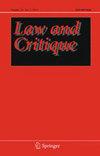法律技术、律师事务所与正确法律答案的想象
IF 0.8
Q2 LAW
引用次数: 0
摘要
法律技术正在发展,它的发展引发了人们对法律职业未来的担忧。在本文中,我们通过借鉴Duncan Kennedy的建议,即主张自己的法律主张的正确性是法律职业的核心特征,来研究法律技术对律师事务所律师在制定想象中的“正确法律答案”方面的核心作用的影响。我们首先询问法律服务组织的变化如何影响律师事务所律师提供“正确法律答案”的能力。虽然法律技术只会加剧已经在进行的消除常规任务的过程,但我们发现,在新的技术投射层下,它继续掩盖意识形态在获得正确法律答案方面的作用。其次,我们询问律师产生“正确法律答案”的能力如何受到以下因素的影响:首先是专家系统,其次是一个名为Bryter的法律技术应用程序,它代表了一个无代码系统。我们发现,专家系统不允许维护肯尼迪的正确法律答案模型所要求的律师的统一性,但像Bryter这样的无代码系统可以做到这一点。无法无天的制度可以简化为一句口号:拥有律师,但要比以前更有效地驱逐她的思想诱惑!本文章由计算机程序翻译,如有差异,请以英文原文为准。
Legal Tech, the Law Firm and the Imagination of the Right Legal Answer
Abstract Legal tech is growing, and its growth provokes anxieties about the future of the legal profession as such. In this article, we examine the impact of legal tech on the central role of lawyers at law firms in crafting an imagined ‘right legal answer’ by drawing on Duncan Kennedy’s suggestion that a claim to the rightness of one’s legal propositions is a central characteristic of the legal profession. We first ask how changes in the organisation of legal services affect the ability of lawyers at law firms to produce that ‘right legal answer’. While legal tech only exacerbates already ongoing processes of eradication of routine tasks, we find that it continues to mask the role of ideology in arriving at a right legal answer under a new layer of technological projection. Second, we ask how lawyers’ ability to produce ‘the right legal answer’ is affected by, first, expert systems and, second, a legal tech application named Bryter, representing a no-code system. We find that expert systems do not permit to uphold the unity of the lawyer required for Kennedy’s model of the right legal answer, but that no-code systems as Bryter do so. No-code systems can be reduced to a slogan: Have the lawyer, but evict her ideological temptations more efficiently than before!
求助全文
通过发布文献求助,成功后即可免费获取论文全文。
去求助
来源期刊

LAW AND CRITIQUE
LAW-
CiteScore
2.30
自引率
25.00%
发文量
19
期刊介绍:
Law and Critique is the prime international critical legal theory journal. It has been published for 20 years and is associated with the Critical Legal Conference. Law and Critique covers all aspects of legal theory, jurisprudence and substantive law that are approached from a critical perspective. Law and Critique has introduced into legal scholarship a variety of schools of thought, such as postmodernism; feminism; queer theory; critical race theory; literary approaches to law; psychoanalysis; law and the humanities; law and aesthetics and post-colonialism. Postmodern jurisprudence, law and aesthetics and law and psychoanalysis were pioneered in Law and Critique which remains the most authoritative international source for these schools of thought. Law and Critique is keen to translate and incorporate non-English critical legal thought. More specifically, Law and Critique encourages the submission of articles in the areas of critical legal theory and history, law and literature, law and psychoanalysis, feminist legal theory, critical race theory, law and post-colonialism; postmodern jurisprudence, law and aesthetics; legal phenomenology; and law and autopoiesis. Past special issues include: ''Critical Legal Education''; ''The Gender of Law''; ''Law and Postmodernism''; ''Law and Literature''; ''Law and Post-colonialism'', ''Law and Theatre''; ''Jean-Luc Nancy and Law''; ''Agamben and Law''. Law and Critique is ranked amongst the top 20 per cent of law journals by the Australian Research Council.
 求助内容:
求助内容: 应助结果提醒方式:
应助结果提醒方式:


